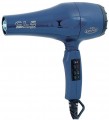Motor type
The type of electric motor installed in the hair dryer.
This parameter is specified if the device does not use a traditional collector (brush) direct current (DC) electric motor, but more advanced motor. The options here might be:
—
AC motor. Hair dryers equipped with alternating current (AC) motors use the same type of power found in regular electrical outlets. These AC motors offer several key advantages over their DC counterparts, including enhanced reliability, durability, and excellent resistance to high loads. They can operate at full power for extended periods without overheating, often lasting for at least 5 years even under continuous use. Additionally, AC motors provide more even heating and facilitate quick adjustments to temperature settings. As a result, hair dryers with AC motors are essential tools in professional settings such as hairdressers and beauty salons. However, the main drawback of AC motors is their relatively higher cost, making them less practical for occasional home use.
—
Brushless motor. A brushless electric motor, which eliminates the need for a traditional commutator and brush contacts, employs a built-in electronic circuit to control the current in the motor windings. Despite being more expensive than conventional brushed motors, they offer several advantages. These motors allow for more precise and wider range adjustments of engine speed an
...d airflow, resulting in higher efficiency and better overall performance for the same power consumption. Moreover, the absence of moving brush components enhances their durability, leading to significantly longer service lives compared to both AC and traditional brushed motors. However, due to their higher cost, brushless models are not widely used even in the professional industry.Functions
—
Turbo mode. A mode designed to dry wet hair as quickly as possible. At the same time, the speed of air movement through the hair dryer increases significantly, and the temperature remains the same. This allows you to quickly dry your hair without exposing it to high temperatures. Working in turbo mode usually involves an increased load on the device, so before using such a hair dryer, you should separately clarify in the instructions for what maximum time you can turn on turbo mode.
—
Auto-rotation of the nozzle. The function of automatic rotation of a brush or other round nozzle (see "Nozzles"). Thus, the user gets rid of the need to turn the entire device when styling hair, which may not be very convenient. Note that with long hair this function should be used very carefully, as there is a risk of entangling them instead of styling.
—
Cold air. The ability of the hair dryer to work without the use of a heating element — when the air flow has the same temperature as the surrounding air. This mode will be useful for drying weakened hair, especially sensitive to overheating. In addition, it can be useful during styling — in particular, cold air “fixes” the finished hairstyle.
—
Ionization. An ionizer is a device for saturating the air with negatively charged oxygen ions. Optimizes styling, giving hair new posi
...tive properties — for example, increased smoothness. Also, the hair is not electrified thanks to the ionizer.
— Steam humidifier. Some hair styling devices may be equipped with a container for liquid and a device that delivers hot steam to the hair. In this case, both ordinary water and a special styling liquid can be used. It is believed that the use of steam greatly facilitates the styling process, as the hair becomes more manageable. On the other hand, the high temperature of the steam can adversely affect the health of the hair, especially if the hair is weak or steam styling is used frequently.
— Alert timer. Devices with a built-in timer that makes audio signal after a set time. This function is relevant in stylers and curling irons, which allows the same time to curl curls. As a result, the hairstyle will have the same curls — there will be no imbalance in the curls when one turned out more and the other less.
— Automatic switch-off. A mechanism that ensures that the device turns off either after a specified period of time, or when a predetermined (or manufacturer-defined) temperature is reached. Prevents excessive heating of nozzles/plates, as well as overheating of the device in general.
— Key lock. The presence of a protective function of blocking the buttons allows you to avoid accidental pressing in the process of working with the device.Cable length
The length of the cord for connecting to the network, provided in the design of the tool.
The long cord provides greater freedom of movement, which is particularly beneficial in hairdressing salons and beauty establishments where professionals need to move around their clients. However, for regular household use, excessive cord length can lead to inconvenience, as it may get underfoot or cause other issues. A cord length of 1 – 1.5 meters is generally sufficient for home use. On the other hand, for professional tasks, tools with a cord length of 1.8 meters or more are commonly available.

